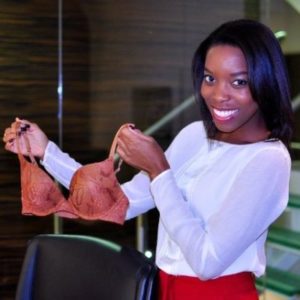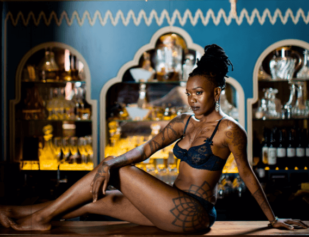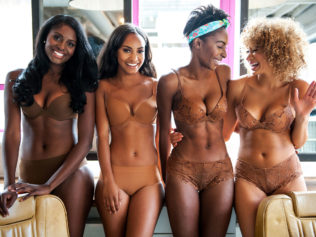The terms “peach” and “flesh” are not interchangeable. Crayola figured that out in 1962, but many cosmetic and fashion companies still lag behind. A quick walk down the cosmetics aisle at any neighborhood drug store, or the hosiery section in a department store, reveals how startlingly limited tone options are for people of color– in spite of the fact that brown people make up three-quarters of the world’s population.
As of late, more cosmetic brands have begun introducing diverse color palettes, but in the world of lingerie, where a “nude” brassiere is more often than not, peach, these advances are slow to come.
That is until now.
Ade Hassan, 31, is the beauty and brains behind Nubian Skin, a specialized lingerie line that is redefining what “nude” means. Brown women all over are buzzing about her collection of brassieres, panties and hosiery that come in a tantalizing array of colors, from cafe-au-lait to cinnamon. Even celebrities are joining in on the praise, including superstars Kerry Washington and Thandie Newton, who recently tweeted about the line.
The London-born, Nigerian entrepreneur conceived the idea for Nubian Skin in the spring of 2011, while she still worked as a consultant, a job in which she had grown restless.
“It was frustrating for me not to be able to find hosiery of the right color, or a nude brassiere, because so many women’s shirts are shear and light weight,” she recalls. “When I walked in the shops and asked for nude, I was given something that just didn’t work.”
Nubian Skin was born out of this frustration.
“The concept sort of popped into my head, and I thought ‘this is it’,” says Hassan who had long envisioned herself as an entrepreneur. “I was so excited because I remember texting a friend and saying, ‘I figured out what I want to do when I grow up.'”
In spite of that initial high, Hassan put the idea for Nubian Skin on the side burner as she focused her energies on her lucrative consulting career. However, her priorities changed in 2012, when that same friend sent her an empowering message on her birthday.
“On the front it said, ‘It’s time to start living the life you’ve always imagined,’ and literally the next day I registered the company.”
While that special note spurred Hassan to action, the path to realizing her vision was lined with hurdles, the first of which was obtaining a manufacturer.
“When you use the words ‘small,’ ‘sample’, and ‘start-up,’ people aren’t very interested in talking to you. They’re not seeing dollar signs,” recalls Hassan, who describes the lingerie industry as “tight knit” and tough to break into.
Entering the fashion industry with a strictly finance background, and facing a wall of rejection, Hassan eventually invested in a consultant to advise her.
“I think that the best money I ever spent,” she says. “You have to be very careful about where you spend your money when you’re starting out and for me, getting special advice was really, really valuable.”
The next challenge was creating an inclusive palette of browns that ethnic women all over the world could enjoy. Hassan spent a year researching colors, the outcome of which is four shades that suit a broad range of melanin-rich complexions— cafe au lait, caramel, cinnamon and berry. The final hurdle came when Hassan left her position in finance to work on Nubian Skin full-time in November of 2014.
“There’s a big adjustment going from a hugely paid comfortable job to doing something where everything is on you,” she says. “You are doing the marketing, finance, PR– You’re doing it all.”
Her experience in the corporate world did, however, supply her with the drive and the seed-money to fund her venture, which was boot-strapped entirely with her own money and investments from family and friends. While Hassan still wears many hats within her small, UK based company, 2015 has proven to be a monumental year. Nubian Skin made headlines when American retail giant Nordstrom announced plans to carry the line in their department stores and online.
“I’m so grateful to Nordstrom because they said, ‘We’ve been following your brand. We have a lot of customers who we are currently not serving and your brand will help us do that,'” says Hassan, who met the buyers from Nordstrom, by chance, at a Paris tradeshow.
In addition to Nordstrom and several boutiques throughout the U.S., which is her largest market, Nubian Skin is also sold on major British retail site, ASOS, in shops throughout Europe, and on the NubianSkin website, from where garments are shipped globally.
“We didn’t have a marketing budget, which was probably a bit foolhardy when we started. I didn’t know how the word was going to get out,” says Hassan, who credits social media with boosting her brand’s reach.
“I think we had about 50 followers on Instagram. I hadn’t really used Instagram before I started the company. We did a photo shoot in August and I put up two pictures from our photo shoot and went on holiday,” she says. ” A few days later we were at 1000. Within four weeks, we had 20,000 followers.”
Since then, the Nubian Skin Instagram account has reached nearly 50,000 followers, and the brand has garnered mentions in press outlets all over the world, including a recent segment on FABlife, Tyra Bank’s new talk-show on ABC.
Hassan’s new approach to undergarments, the foundation to any wardrobe, may in fact send ripples throughout the entire fashion industry, where brands hope to cater to the multi-ethnic market as it grows in number and spending power.
“We track our orders and we’ve had orders from a lot of big brands who’ve ordered our colors,” she says. “We can tell that people are obviously taking note and seeing that something is happening here and they are probably quite keen to get in on it. ”
Hassan regards trailblazing beauty entrepreneurs Eunice Johnson and Iman, creators of Fashion Fair and Iman cosmetics lines respectively, as her personal icons as she aims to build a comparable business in the lingerie industry.
Three years after receiving that empowering birthday card from her friend, Hassan is living the life of her dreams, though she confesses that building a brand from the ground up is anything but easy.
“If you’re going to be an entrepreneur, make sure that you 110 percent believe in the idea and know that it’s something that’s needed,” she advises. “It’s going to be so much hard work, so much harder than you anticipated. And you have to be fine with that.”


